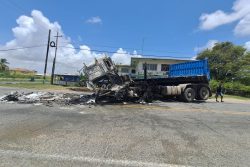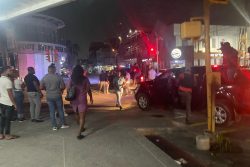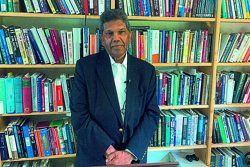Dissatisfied with the muzzling of smaller parties that form the APNU+AFC coalition from speaking out independently on issues, the Working People’s Alliance (WPA) plans to push for consultation in decision making in APNU, the main constituent in the government.
“The WPA is also not comfortable with the level of consultation within the APNU and within the larger coalition,” WPA executive David Hinds told Stabroek News.
“That lack of consultation has minimized opportunities for the WPA to influence policy beyond the Cabinet. In the coming period the WPA intends to be more vigorous in pushing for more consultation with the APNU and the corridors of power,” he added.
The WPA is regarded as an influential member as it was one of the first parties to join with the People’s National Congress Reform in the formation of APNU with Minister of Education Dr Rupert Roopnaraine being chosen as the WPA’s ministerial representative when the party won the general elections in 2015.
Addressing key areas of concern, Hinds said that while the party believes it has a lot to offer in the area of social cohesion, it has not been consulted and plays no formal role in the work of the Ministry of Social Cohesion.

“WPA feels strongly about many issues, including constitutional reform, the third term, the future of the sugar industry, the coming of the oil economy, living wages for the poor and the overall health of the working class. We feel very strongly on the issue of stamping out corruption and the recovery of state assets,” he posited.
“On the matter of social cohesion, we feel we have a lot to offer in that area. We have not been consulted and we play no formal role in the work of that Ministry. As a party with a history of multiracial advocacy, we have lots of experience in that area. WPA has every intention of helping to strengthen this government,” he added.
It is to this end he asserted that “in the coming period” the WPA would be speaking out more on national issues. However, the promised vocal posture should not be taken to mean that the party’s voice would be for trivial matters.
He explained, “Despite our limited role, we are not in the business of undermining the government. We intend to play some meaningful role in helping the government advance its agenda… if people expect us to bash the government at every twist and turn, they will be disappointed. Our critique, if we must offer such will be in the interest of defending the poor and strengthening the progressive agenda of the government.”
“The WPA is not happy with everything the government has done. But we feel overall that the presence of this government has put a break on the criminalization of the State. That is big for us. There have been no systematic human rights abuses under the government. There has been no racial marginalization under this government. That is big for us. Yes, there have been a few instances of racial insensitivity, but no racial marginalization. The area of our disappointment with the government is how it has dealt with the empowerment of the poor and the powerless. We are not necessarily comfortable with the management of the political economy. But we recognize how complex that job is, given the way in which the PPP has racialized and destroyed the economy, including the giveaway of state assets. But WPA feels that two years is not enough to make a definitive judgement of the government in that regard.”
Hinds said that it was understandable that given the WPA’s history of resistance politics, some commentators and sections of the society expect the party to speak up and speak out on what they perceive as the shortcomings of the present government. This the party takes as a compliment since it shows the populace’s acknowledgement of not only their role in Guyana’s political evolution, but also as a recognition by the larger society of the persistent need for public oversight of government.
Frustrating
And with some persons expressing views that they believe that the WPA was stuck in time, Hinds said it was a position that is frustrating for his party.
“Yes, the Walter Rodney era was perhaps the high point of the WPA’s activism. But Rodney was on the scene for five years and his national profile really rose in the 1979-80 Civil Rebellion, when he and the WPA led a spirited mass protest against the government of the day. It’s now 37 years later and Guyana and the world have changed in many ways. The WPA like all political parties has had to respond to those changes. The PNC eventually lost power 12 years after Rodney’s death. That represented a culmination of persistent protest and the WPA continued after Rodney’s death to play a leading role in the pro-democracy movement. The party had to adjust to the realities of the post-Rodney era and we did. We built a structured party, a process that was in its infancy when Walter was assassinated. Of course, a movement does not lose its most inspirational leader and not be affected. Yes, Rodney’s assassination slowed down the pace of the struggle as a whole—the entire movement, not just the WPA, had to adjust to that reality,” Hinds, who is a Professor of Political Science at the Arizona State University, stated.
Further he added, “You often hear this nonsense that the WPA died when Rodney died. Some think they are being kind to Rodney when they say that, but what they are in fact saying is that Rodney did not even leave a legacy. But that is not true; the Rodney legacy lived on in the WPA’s work, but that legacy is bigger than any party—it’s national, regional and global. The return of democratic elections changed the face of party politics in Guyana. It meant a return to the rigid politics of ethnic preferences and loyalties. It is fair to say we in the WPA generally underestimated the strength of those impulses in 1992. We felt that having softened ethnic politics in the fight against dictatorship that that impulse would carry over into the electoral arena. We were wrong. We now know how difficult it is to build a multi-racial electoral force in an ethnically polarized society. No single party has been able to do so anywhere in the world. Whenever it was achieved, it was done by coalitions.”
‘Left out’
The opposition People’s Progressive Party came in for sharp criticism from Hinds who reminded that although the PPP knew of the struggles the WPA’s members endured when the PNC was in government, it shunned them when they won government in 1992.
It is for the 23 years of being ostracized that Hinds said saw the WPA using its remaining influence to work with the very PNC that it had fought with, to now dislodge the PPP; a decision it has not regretted. This is because unlike the PPP who got into government and shunned them, the APNU+AFC coalition was inclusionary which sees them now as a part of government.
Said Hinds, “the WPA was left out of government by the PPP, which monopolized the governmental space—it selfishly took the reins of government for itself, although others such as the WPA had equally contributed to the return of democratic elections. It was a colossal mistake that Guyana has not recovered from to this day. The one-party PPP government returned the country to dictatorship in a more decadent form than under the PNC. In the process, the multiracial space built up during the struggle against PNC rule was diminished. The PPP’s deliberate ethnic domination agenda meant that African Guyanese were pushed right back into their ethnic enclave and Indian Guyanese, encouraged to believe that it was time for revenge, similarly retreated to their enclave. In such circumstances the space for a party like the WPA decreased. The party’s multi-racial idealism never appealed to a new generation of Guyanese that was weaned on the politics of ethnic zero-sum.”
“Just as we had to make the hard decision during the PNC days to enter into alliance with one of the big wolves, we had to enter into an alliance with the other one to again stop dictatorship. Alliance with the PNC was difficult given our long history of mutual antagonism. But we felt it was necessary to stop the PPP’s barrage. We did it and we have no regrets. We saved Guyana from being obliterated as a viable democratic country,” he added.









